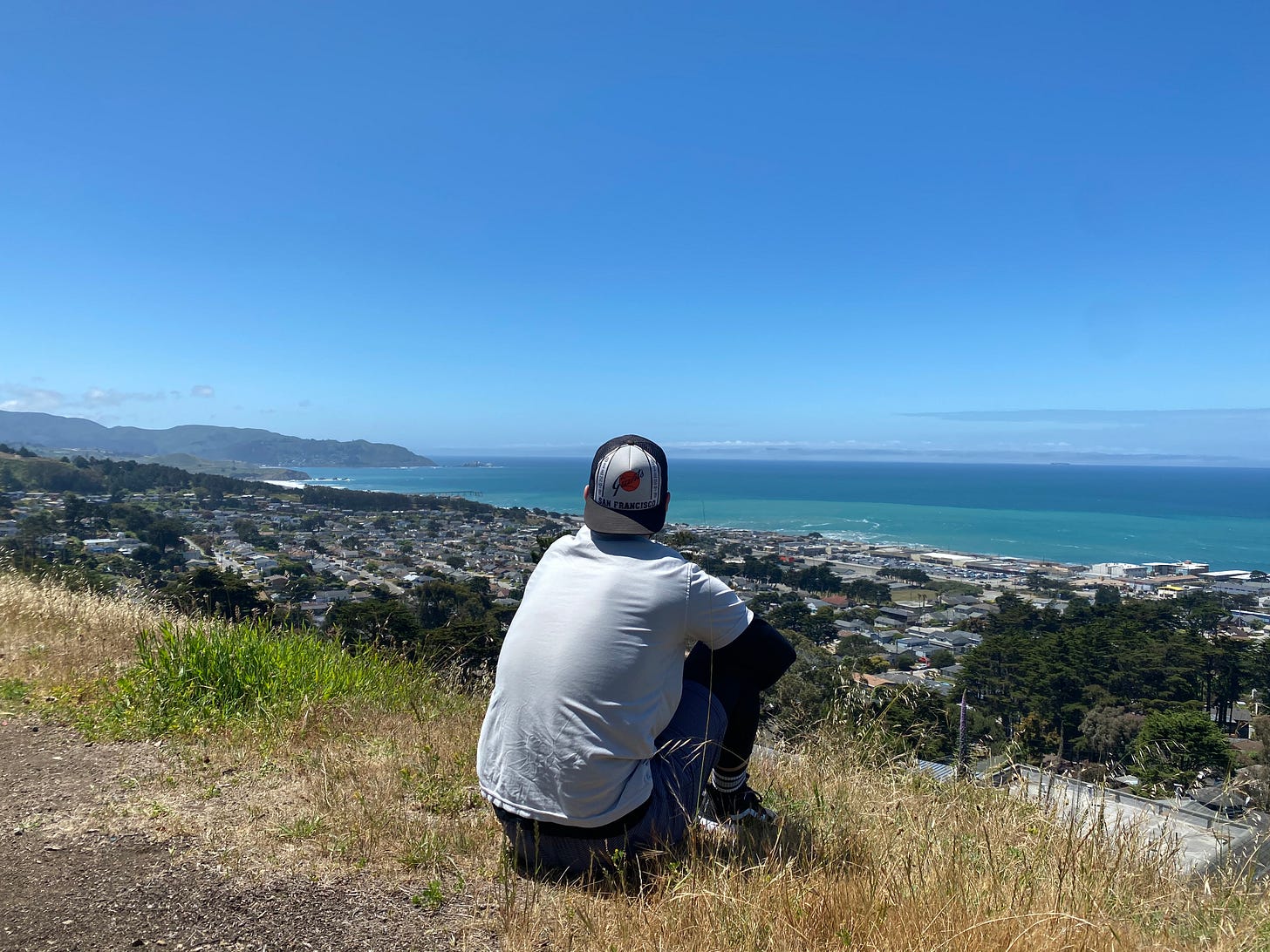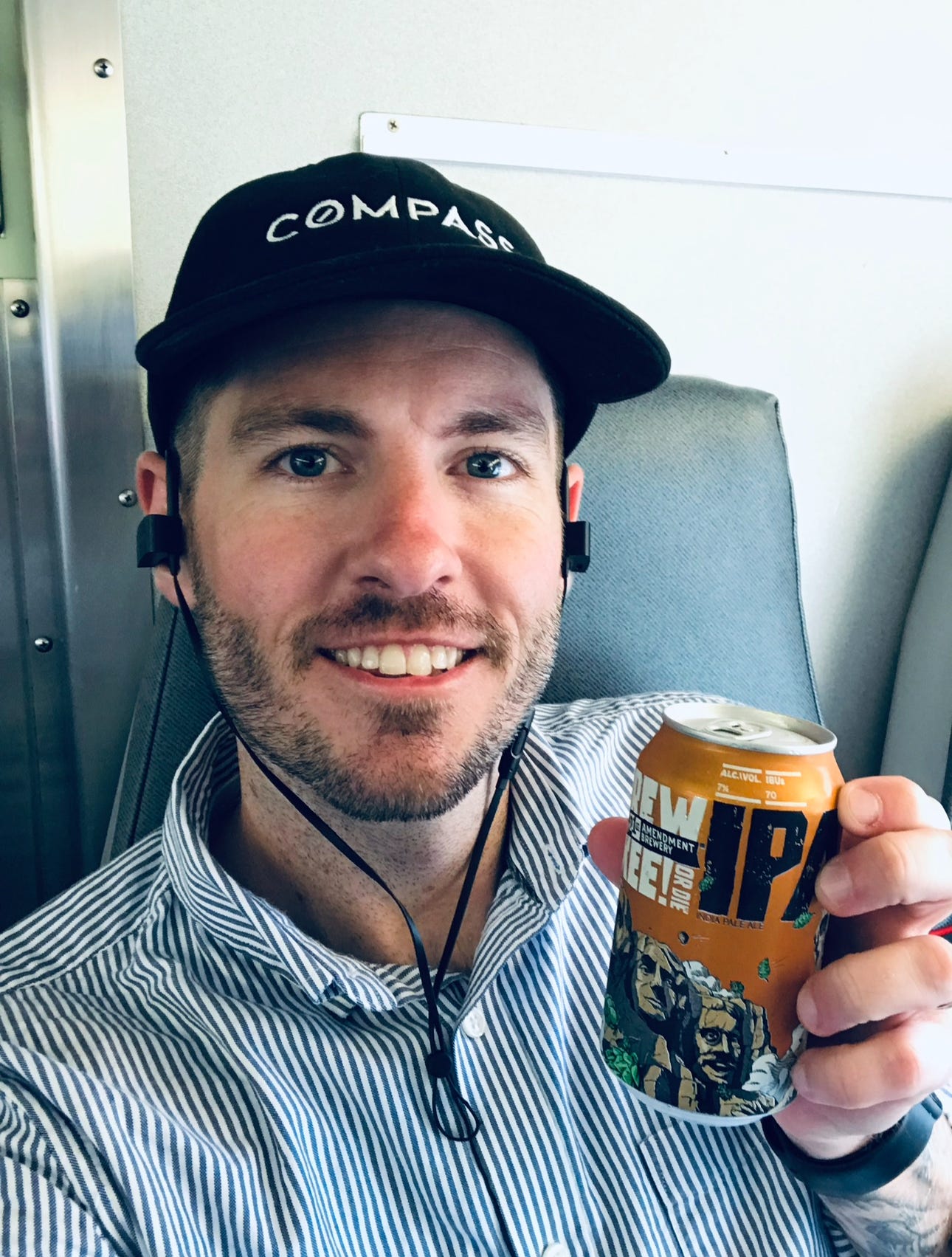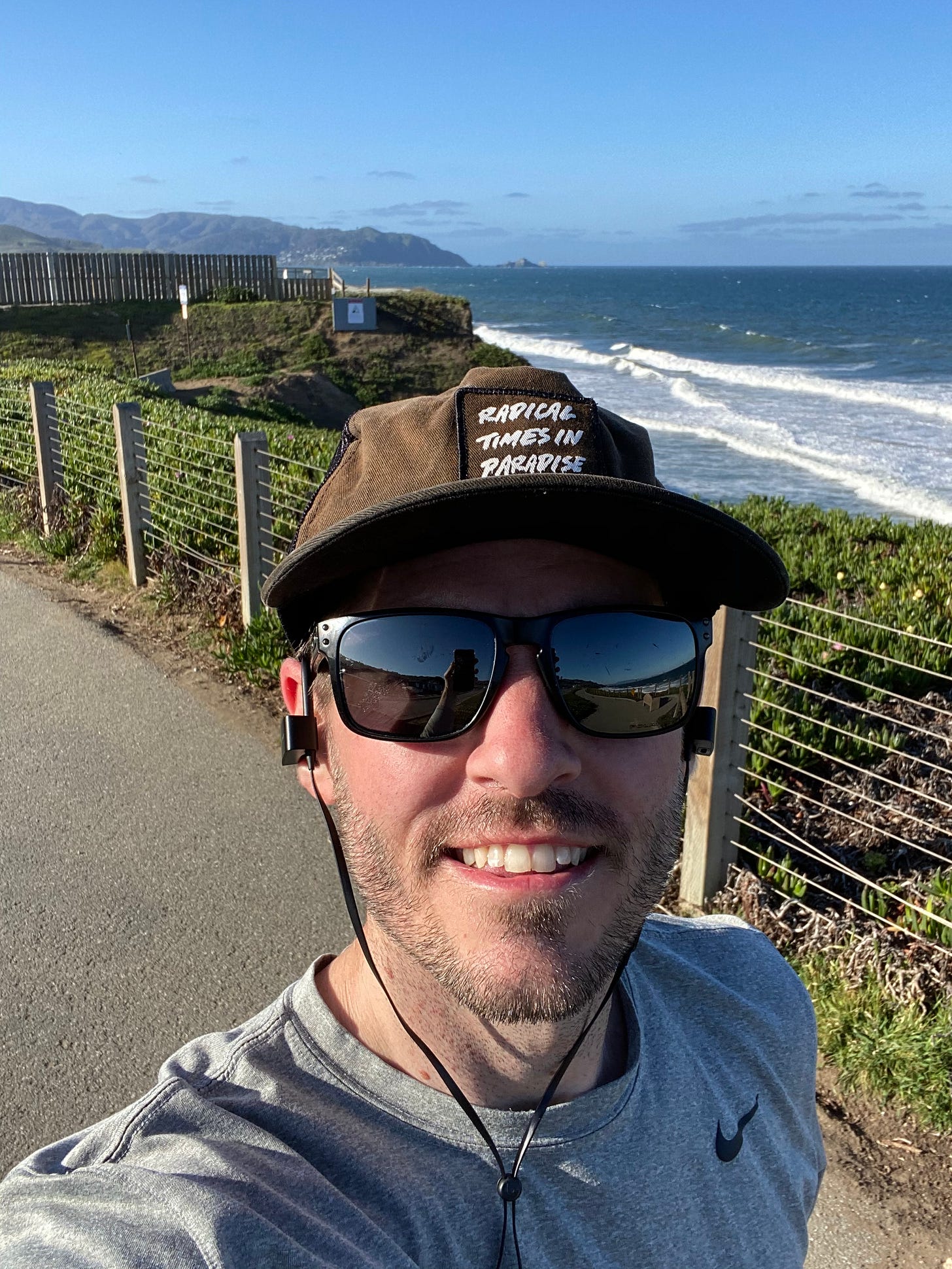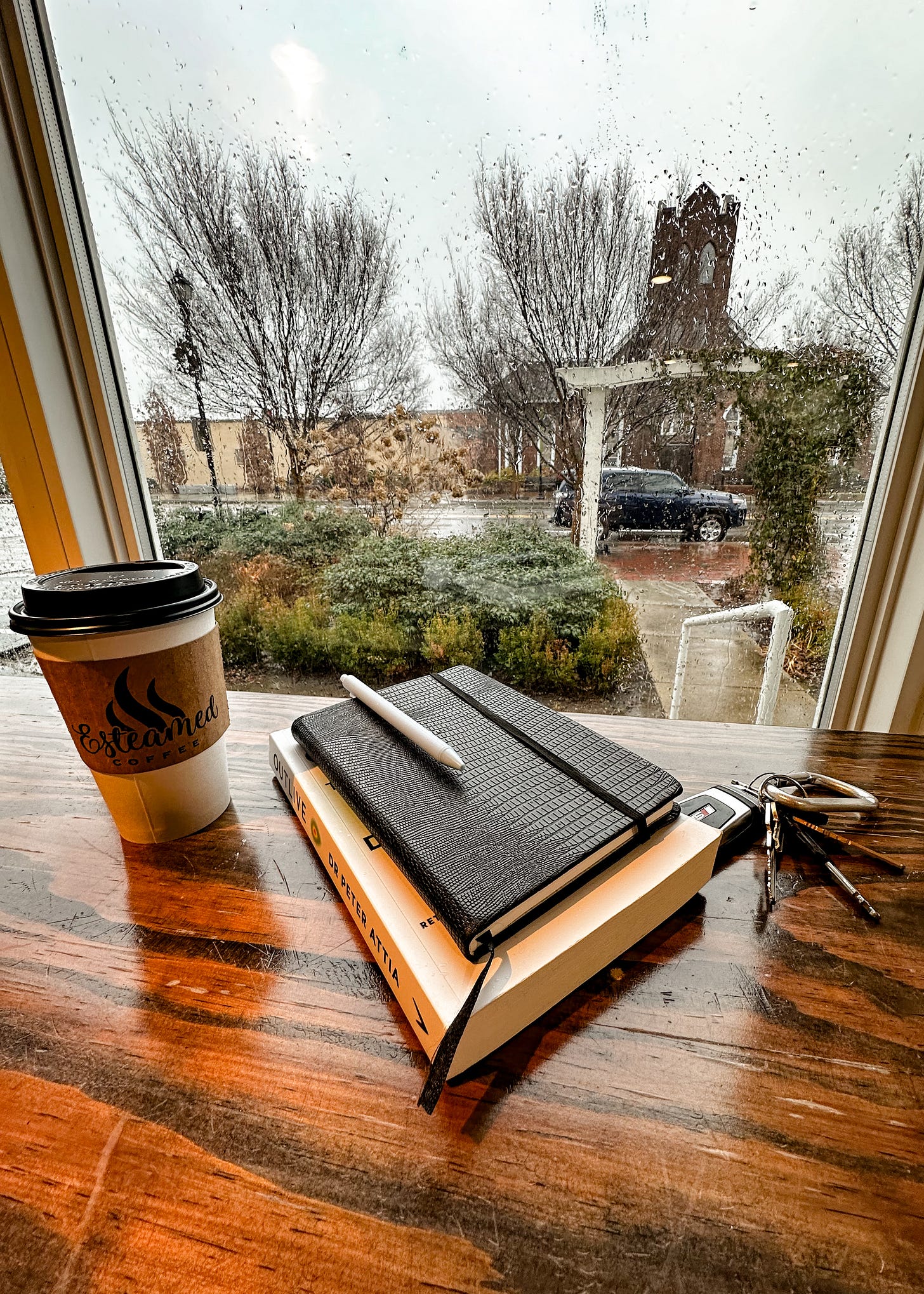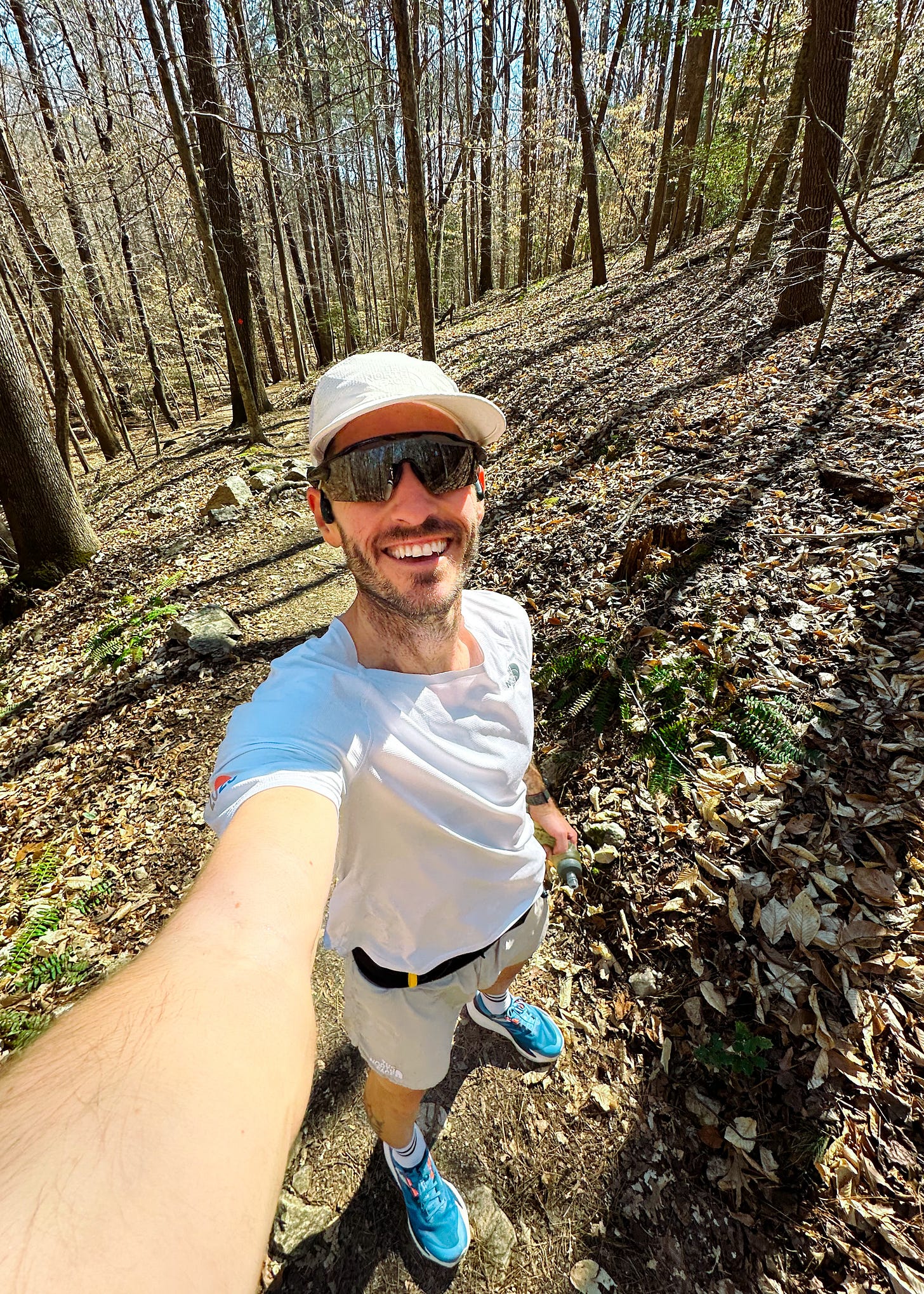Me Time
One hour a day is all it takes to change your life. This is how I found mine.
For the last eight years, I've been obsessed with time.
It didn't start with some dramatic life event or a brush with mortality … it started with a train ride.
In 2018, I was living on the edge of San Jose's Japantown, commuting 100 miles roundtrip to San Francisco and back every day. To avoid the Bay Area's legendary traffic and squeeze in some exercise, I chose to bike five miles to the train station, ride the train north for an hour with my bike in the rack, then pedal another five miles to the office. Three hours daily. Fifteen hours weekly. Over two years of my life, just getting from here to there. I'd claim a window seat and let my eyes drift over the Santa Cruz mountains, the soft rumble of tracks feeling almost meditative until the conductor interrupted to check for tickets.
Somewhere on those rides, I started feeding my mind differently. I'd read that the average American spends roughly 35 minutes in their car every day … commuting, errands, kid pickup … and if you spent those 35 minutes learning something that mattered to you, within a year you'd have the equivalent of a doctorate in that subject. It made perfect sense. I'd been listening to music my whole life and could recite every lyric to my favorite songs. I thought to myself, why not put that time to better use?
So I turned my Beats headphones away from music and toward podcasts like The School of Greatness and Impact Theory … podcasts that were focused on entrepreneurs, athletes, and thinkers talking about career, relationships, setbacks, and building a life worth living. Real conversations about the stuff that actually shapes how your days feel and helps you think outside of your own little bubble.
One episode I remember in particular featured John Maxwell, one of the world's most respected leadership coaches. He said something that really got my attention… "We are all a book with blank pages … and we each hold the pen." Meaning, we have the power to write our life story, not someone else.
That line has stuck with me over the years. At the time, I was filling my own pages with other people's agendas, timetables, and expectations … and I didn't want my life book to read that way. It felt like I was handing over the pen to everyone except the person who should be holding it … me. My story wasn't being written in my own voice.
I didn’t have a name for it yet, but those train rides planted a seed. I knew I needed a space in my day that was mine … a place to think, reflect, and refill my own tank. That seed would eventually grow into what I now call Me Time.
Now, I think it should be noted that this isn't a story about mortality … though I'll probably get to that at another time! This is more about how I redefined my relationship with time and built a habit that still shapes my life today.
Me Time is simple at its core: every day, we all get a fresh twenty-four hours. Society likes to convince us that most of those hours aren't ours, that we're too busy, that we have "no time." But that's just not true. What I've found to be true is that most of us are just terrible at managing the time we do have.
Yes, there are fixed obligations like dropping kids off at daycare, work hours, sleep. But the rest? We give it away far too easily to social media, mindless scrolling, and things that don't actually make us feel alive. And if you're reading this thinking, "Mike, I literally have no free time," I'd challenge you to pull up your calendar and prove it to yourself. In eight years of practicing Me Time, I've found space in every single person's day who has ever told me that.
It's a hard lesson I had to face too. For years, I used "no time" as an easy excuse that hid my own insecurities … my unwillingness to admit I wasn't really in charge of my life when I actually was, and instead just choosing to ignore the problem out of comfort. Confronting it would mean I might actually need to change something, and for most of my early adult years, that felt too bold and too risky.
Here's how I think about it now… Most of us understand financial budgets or at a minimum are aware of the concept of a budget. Most people do a budget backwards … they pay themselves last. We get paid, then pay our bills and hope something's left to save. Any great financial advisor will tell you to pay yourself first. The first ten to twenty percent of your paycheck goes straight into savings or investments, something that builds your future. Automate it so you never even see it. Then live on what's left.
Time works the same way. If you don't pay yourself first, your hours will always get eaten by something or someone else. Your attention … aka your time … is the most valuable commodity every company and social influencer is desperately trying to capture. They've built entire business models around stealing your time.
This idea around budgeting my time was crystallized when I discovered Ramit Sethi's Money Dial concept in I Will Teach You to Be Rich. His take is centered around spending more on things you love, while cutting back on things you don't. Hate shopping but love to travel? Spend more on trips and less on clothes. Simple math that honors what actually matters to you.
It was through this concept that I realized I could dial my hours the same way.
So in 2018, I decided to start treating my time like my money. Every day, I would pay myself first … a non-negotiable one-hour block to do whatever I wanted, as long as it filled my cup and was something I wanted to do. No guilt. No apology. No exceptions. Then the remaining twenty-three hours could go to work, errands, family, sleep, and everything else life demanded.
I started small, protecting that hour like it was sacred, experimenting with what filled me up versus what just killed time. Some days it was reading. Other days it was longer walks around the neighborhood. I was learning what my version of paying myself first actually looked like in practice.
Then COVID hit, and everything sort of shifted.
We'd just moved to Pacifica, a tiny beach town most people blow through on their way from San Francisco to Santa Cruz. Remote work suddenly eliminated my fifteen-hour weekly commute … those train rides that had started this whole journey were gone, replaced by masks and more than a dozen hours in my week. Getting those hours back felt like found money, and I wasn't going to waste them.
Every day, I'd walk the neighborhood for an hour, podcasts in my ears, ocean in view. Those walks turned into jogs, which became runs, which eventually led me to ultra trail running. Not through some grand training plan, but through Me Time … one protected hour that grew into something I never saw coming.
Over time, Me Time transformed how I live. Running became my space to process life's hardest questions. It was during Me Time where I wrestled with and eventually decided to quit alcohol. It's where I worked through how to repair my marriage, and pictured the kind of father I wanted to be. It became the space where I reflected on what I was already proud of instead of always chasing the next achievement. More recently, Me Time has expanded into writing … documenting the thoughts that rattle around in my head, giving them shape and purpose.
Here's what I want to leave you with… once you start treating your time like this, you also get better at saying no. No to things that drain you. No to commitments that don't matter. No to the idea that being busy is the same thing as being fulfilled. You start recognizing the difference between motion and progress, between filling hours and filling your life.
The ripple effect of this approach is real. When you protect time for yourself, you show up differently everywhere else. You're more present with your family because you're not silently resentful about never having space to breathe or do the things you love to do. You're sharper at work because you're not running on fumes. You make better decisions because you've given yourself room to think.
As you finish reading this I want you to take a look at your own calendar. Are you paying yourself first, or is society writing your pages for you? Can you carve out at least an hour a day for something that makes you feel lighter, stronger, or more alive? And if you can find one hour, what happens when you turn the dial up even more? What would your life look like if you stopped prioritizing everyone else and started to focus on filling your own cup first?
If you want an intentional life, you have to make intentional choices. Most people just drift through their days, reacting to whatever demands the loudest attention, wondering why they feel empty despite staying busy. They eventually arrive at the end of their life wondering why they didn’t do more of the things that make them feel alive, happy, fulfilled.
Me Time is how I write my story … one hour, one choice, one day at a time. And if those train rides taught me anything, it’s that if I’m not the one holding the pen, someone else will.


